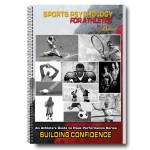“Confidence is everything in this game, if you don’t think you can, you won’t” – Jerry West
 At the top of the peak performance pyramid sits emotions.
At the top of the peak performance pyramid sits emotions.
It’s closest to the top of the pyramid (above motivation, confidence, intensity, and focus) because emotions will ultimately dictate how you perform and how mentally tough you will be..
Emotions during a competition can cover the spectrum from excitement and elation to frustration, anger, and disappointment.
Emotions are often strong and troublesome; they can linger and hurt your mental game in basketball long after you first experience them.
Negative emotions can hurt your performance both physically and mentally.
They first cause you to lose your prime intensity. With frustration and anger, your intensity goes up and leads to muscle tension, breathing difficulties, and a loss of coordination. It also saps your energy and causes you to tire quickly.
When you experience despair and helplessness, your intensity drops sharply and you no longer have the physical capabilities to perform well.
Negative emotions can also hurt your mental game in basketball.
Your emotions are telling you that, deep down, you’re not confident in your ability to perform well and achieve your competitive goals.
Your basketball confidence will decline and you will have negative thoughts to go along with your negative emotions. Also, since your negative emotions are so strong, you will likely have difficulty focusing on what will help you to perform well. The negative emotions will draw your attention onto all of the negative aspects of your performance.
Finally, negative emotions can hurt your motivation to perform because you just don’t feel good and it’s no longer fun.
Negative emotions can be provoked by many occurrences during a game including bad calls, senseless mistakes, making an error at a crucial point in the competition, and just performing poorly.
All of these events share two common elements that lie at the heart of what causes the negative emotions: You feel that the path to a goal is being blocked and you don’t seem to have control over removing the obstacle. For example, you are losing to an opponent that you believe you should beat and, no matter what you try, you can’t seem to turn the game around.
You are likely to experience frustration and anger initially. These emotions can be helpful at first because they motivate you to fight to clear the path to your goal and regain control of the game. But if you’re unable to change the course of the game, then you may experience despair and helplessness, in which you will accept that you can’t win, so you just give up.
Try the following things to manage and decrease your negative thoughts. My workbook “An Athlete’s Guide to Peak Performance Series– Building Confidence” will give you more details on how to build your confidence in these areas and much more.
1. Recognize thought distortions.
2. Challenge negative thoughts.
3. Take a break from negative thoughts
4. Release judgment.
5. Focus on your strengths.
To build your confidence you must change the way you think.
A 100% of the time it is 90% mental.
Confidence is a mind-set skill that doesn’t just happen by chance. You must work at it.
To build your confidence, specific strategies are required. These strategies can be found in my workbook – An Athlete’s Guide to Peak Performance Series– Building Confidence
Go to sportspsychologybasketball.com. Click products and get started on Building Your Confidence with Sports Performance Top Mental Game Coach.
